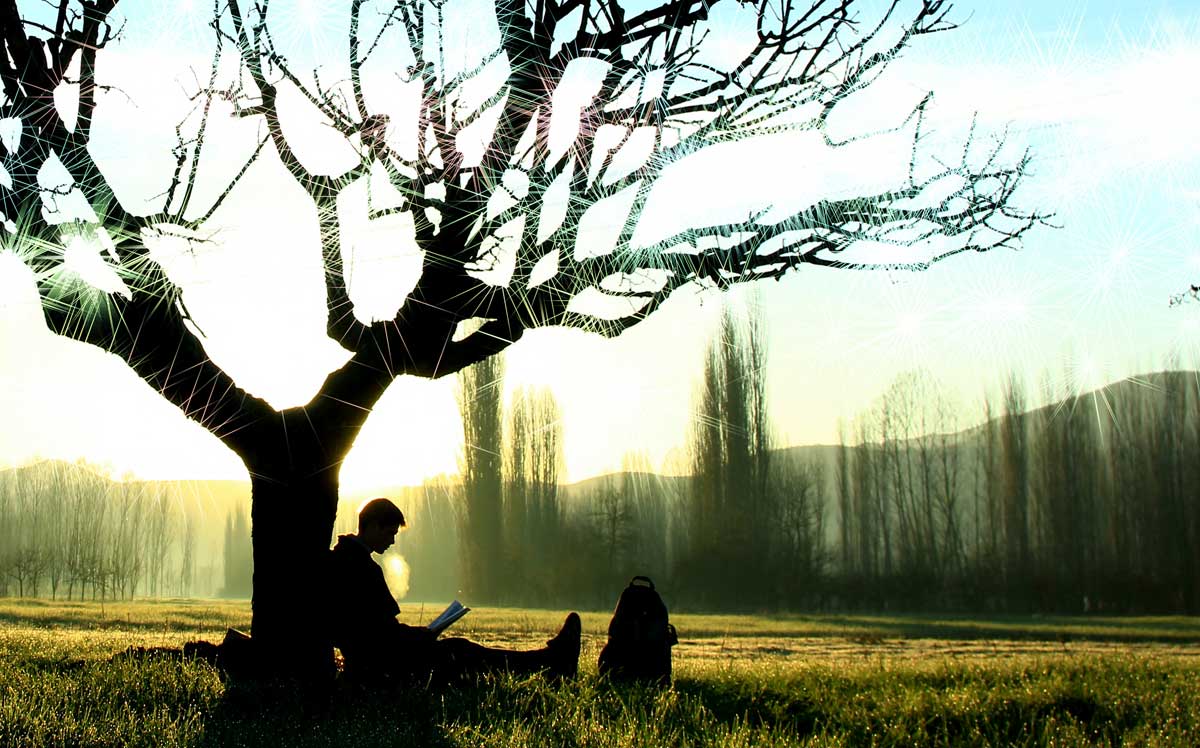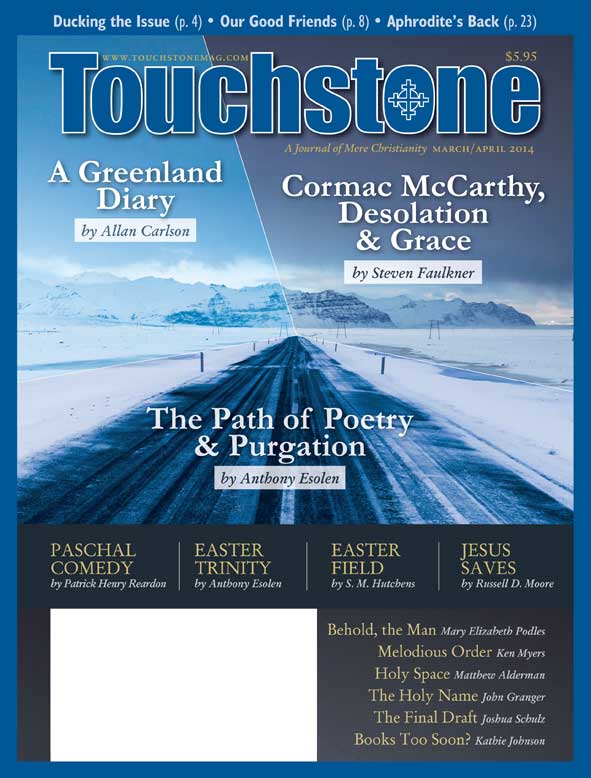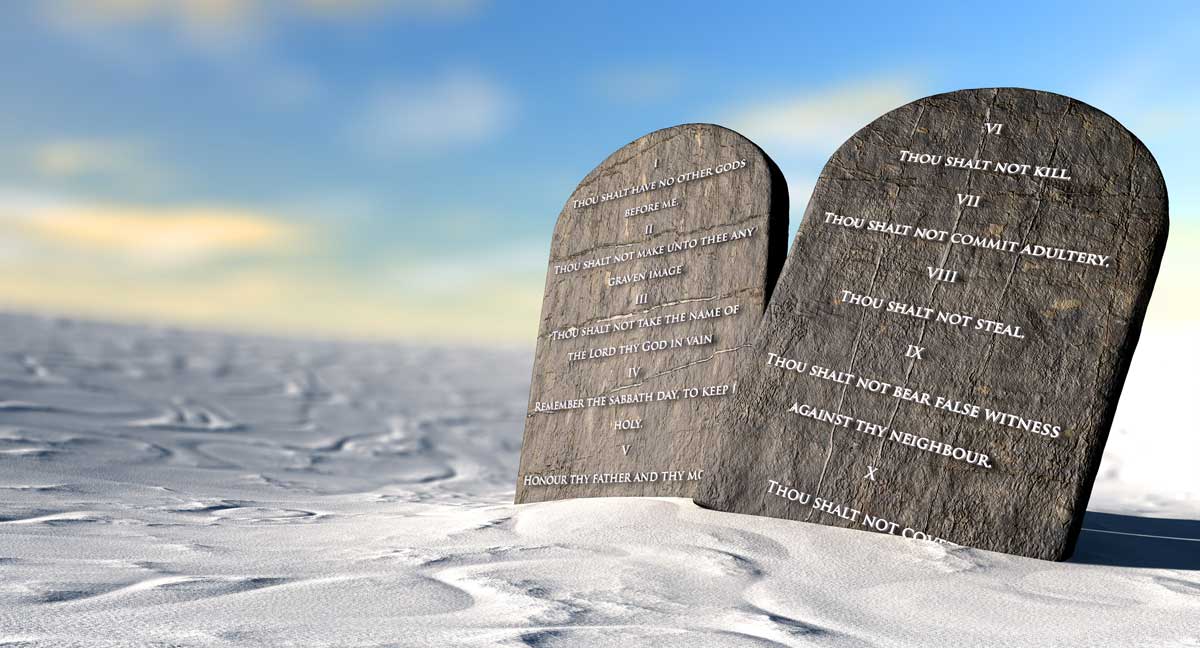Feature
Poetry Above Compulsion
Higher Education Should Advance the Glorious Liberty of the Sons of God
by Anthony Esolen
In the dim years of the sixth century, when the half-barbarian Germans had perforated the Roman Empire in the west, St. Benedict drew up his Rule, a counteroffensive, a plan for battle. I am not claiming that he understood it as such, in any political sense. But in the midst of that crumbling civilization, he sheltered in his citadel what civilization is ultimately for: the freedom of the human spirit to contemplate the everlasting things, and to share with others the fruits of that contemplation.
If we consider it in that light, it was no accident at all, but the foreseeable consequence of the work of Christian prayer, that his monks would preserve and hand on to future generations the great expressions of human freedom made manifest in the poetry and philosophy of the pagan world. It was not the first time, and it would not be the last, that, in her devotion to God, a devotion made possible by the grace that at once satisfies all that is human in us and raises us beyond ourselves, the Christian Church should do for man what he could not do for himself.
What did the world understand then, if not conquest? What does it understand now? Our barbarians do not scale our city walls with fire and sword. Their weapons are more impressive than that. Now all the massed ordnance of technology and advertising and broadcasting, all the manifold lies told by economic and political determinists, all the self-compelled ambitions of scientists whose livelihoods depend on homage to the daemon demanding, "Farther, more"—all of those engines of compulsion are aimed against the very being of man, to set him free from his humanity, free to sink back into the blamelessness of the beast, or into the inert apathy of a mere object, not above the moral law, but beneath it.
Man Needs the Heavens
The Church alone remains, proclaiming that all created things find their end only in the beatitude of man, because, as St. Paul mysteriously says, "the creature itself also shall be delivered from the bondage of corruption into the glorious liberty of the children of God" (Rom. 8:21). The Church is for the world, because she is for man; the Church is for man, because she is for God.
That is why we now see that almost the only schools where reverence for humanistic letters is to be found are also places of prayer. This is not because their professors have grown stubborn and antiquarian. It is again the foreseeable consequence of following Christ in a dark age. The air is cleaner in the citadel at the mountaintop, and they who still yearn for it can drag themselves out of the current of the times, fight through the thickets, and climb that mountain, to breathe freely as men, to see, and to wonder.

That is what our Christian colleges and schools should be about. It is the principle that underlies Cardinal Newman's work, The Idea of a University. Newman does not deny that we need tradesmen—we need merchants, and carpenters, and scientists engaged in applied research, and plumbers. But, if I may be allowed the play on words, we need most what we do not need at all. Grant a man a hundred years of health, good food, sexual release, and what passes for important work; grant him that on condition that he remain in a well-decorated basement, with a ceiling fixed over his head, and a painted heaven dotted with painted stars in his room at night, and he will go mad. He needs more than to see. He needs to behold. He needs the heavens.
A Work of Love & Joy
Let me begin to illustrate the point by bringing to your attention a couple of works of art both human and sacred. Recently, my family and I visited New Bedford, once a jewel of a town, with cobblestone streets and colonial houses built by the men who went down to the sea in ships, to hunt the great whales and bring back the whale-ivory and oil and spermaceti. Those ventures engaged maritime peoples from all over the world, including the Portuguese, from Portugal and the Azores and the Cape Verde Islands, many of whose descendants still live in New Bedford and the area around it. The museum in New Bedford is filled with their works of art—folk art, as we would call it. The whalers were not exceptionally learned men. One object impressed me most by its extraordinary delicacy and beauty.
Anthony Esolen is Distinguished Professor of Humanities at Thales College and the author of over 30 books, including Real Music: A Guide to the Timeless Hymns of the Church (Tan, with a CD), Out of the Ashes: Rebuilding American Culture (Regnery), and The Hundredfold: Songs for the Lord (Ignatius). He has also translated Dante’s Divine Comedy (Random House) and, with his wife Debra, publishes the web magazine Word and Song (anthonyesolen.substack.com). He is a senior editor of Touchstone.
subscription options
Order
Print/Online Subscription

Get six issues (one year) of Touchstone PLUS full online access including pdf downloads for only $39.95. That's only $3.34 per month!
Order
Online Only
Subscription

Get a one-year full-access subscription to the Touchstone online archives for only $19.95. That's only $1.66 per month!
bulk subscriptions
Order Touchstone subscriptions in bulk and save $10 per sub! Each subscription includes 6 issues of Touchstone plus full online access to touchstonemag.com—including archives, videos, and pdf downloads of recent issues for only $29.95 each! Great for churches or study groups.
Transactions will be processed on a secure server.
more on education from the online archives
more from the online archives
calling all readers
Please Donate
"There are magazines worth reading but few worth saving . . . Touchstone is just such a magazine."
—Alice von Hildebrand
"Here we do not concede one square millimeter of territory to falsehood, folly, contemporary sentimentality, or fashion. We speak the truth, and let God be our judge. . . . Touchstone is the one committedly Christian conservative journal."
—Anthony Esolen, Touchstone senior editor












